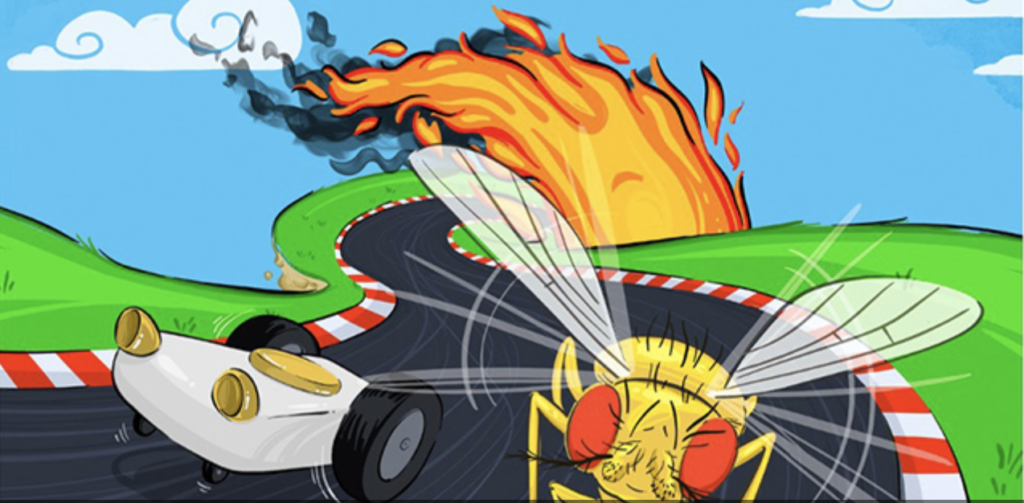New research* from Northwestern University in the USA demonstrates that fruit flies use decision-making, learning and memory to perform simple functions like escaping from heat. The findings are now being used to challenge how we think about self-driving cars.
“The discovery that flexible decision making, learning and memory are used by flies during such a simple navigational task is both novel and surprising,” said Marco Gallio, the study’s author. “It may make us rethink what we need to do to program safe and flexible self-driving vehicles.”
According to Gallio, an associate professor of neurobiology in the Weinberg College of Arts and Sciences, the questions behind this study, published in the journal Nature Communications, are similar to those vexing engineers building cars that move on their own. How does a fruit fly (or a car) cope with novelty? How can we build a car that is flexibly able to adapt to new conditions?
This discovery reveals brain functions in the household pest that are typically associated with more complex brains like those of mice and humans: “Animal behavior, especially that of insects, is often considered largely fixed and hard-wired – like machines,” explained Gallio. “Most people have a hard time imagining that animals as different from us as a fruit fly may possess complex brain functions, such as the ability to learn, remember or make decisions.”
To study how fruit flies tend to escape heat, the Gallio lab built a tiny plastic chamber with four floor tiles, the temperature of which could be independently controlled. They confined the flies in the chamber and then used high-resolution video recordings to map how each one reacted when it encountered a boundary between a warm tile and a cool one. They found flies were remarkably good at treating heat boundaries as invisible barriers to avoid pain or harm.
Using real measurements, the team created a 3D model to estimate the exact temperature of each part of the fly’s tiny body throughout the experiment. During other trials, they opened a window in the fly’s head and recorded brain activity in neurons that process external temperature signals.
Miguel Simões, a postdoctoral fellow in the Gallio lab and co-first author of the study, said flies are able to determine with remarkable accuracy if the best path to thermal safety is to the left or right. Mapping the direction of escape, Simões said flies “nearly always” escape left when they approach from the right, “like a tennis ball bouncing off a wall”.
“When flies encounter heat, they have to make a rapid decision,” said Simões. “Is it safe to continue or should it turn back? This decision is highly dependent on how dangerous the temperature is on the other side.”
Observing the simple response reminded the scientists of one of the classic concepts in early robotics: “In his famous book, the cyberneticist Valentino Braitenberg imagined simple models made of sensors and motors that could come close to reproducing animal behavior,” noted Josh Levy, an applied math graduate student and a member of the labs of Gallio and applied math professor William Kath. “The vehicles are a combination of simple wires, but the resulting behavior appears complex and even intelligent.”
Braitenberg argued that much of animal behavior could be explained by the same principles. But does that mean fly behavior is as predictable as that of one of Braitenberg’s imagined robots?
The Northwestern team built a vehicle using a computer simulation of fly behavior with the same wiring and algorithm as a Braitenberg vehicle to see how closely they could replicate animal behavior. After running model race simulations, the team ran a natural selection process of sorts, choosing the cars that did best and mutating them slightly before recombining them with other high-performing vehicles. Levy ran 500 generations of evolution in the powerful NU computing cluster, building cars he ultimately hoped would do as well as flies at escaping the virtual heat.
This simulation demonstrated that ‘hard-wired’ vehicles eventually evolved to perform nearly as well as flies. But while real flies continued to improve performance over time and learn to adopt better strategies to become more efficient, the vehicles remain ‘dumb’ and inflexible.
The researchers also discovered that even as flies performed the simple task of escaping the heat, fly behavior remains somewhat unpredictable, leaving space for individual decisions. Finally, the scientists observed that while flies missing an antenna adapt and figure out new strategies to escape heat, vehicles ‘damaged’ in the same way are unable to cope with the new situation and turn in the direction of the missing part, eventually getting trapped in a spin like a dog chasing its tail.
Gallio said the idea that simple navigation contains such complexity provides fodder for future work in this area.
*The paper is titled Robustness and plasticity in Drosophila heat avoidance. In addition to Gallio, Simões, Kath and Levy, authors on the paper include Emanuela Zaharieva, Leah Vinson, Peixiong Zhao, Michael Alpert and Alessia Para.


